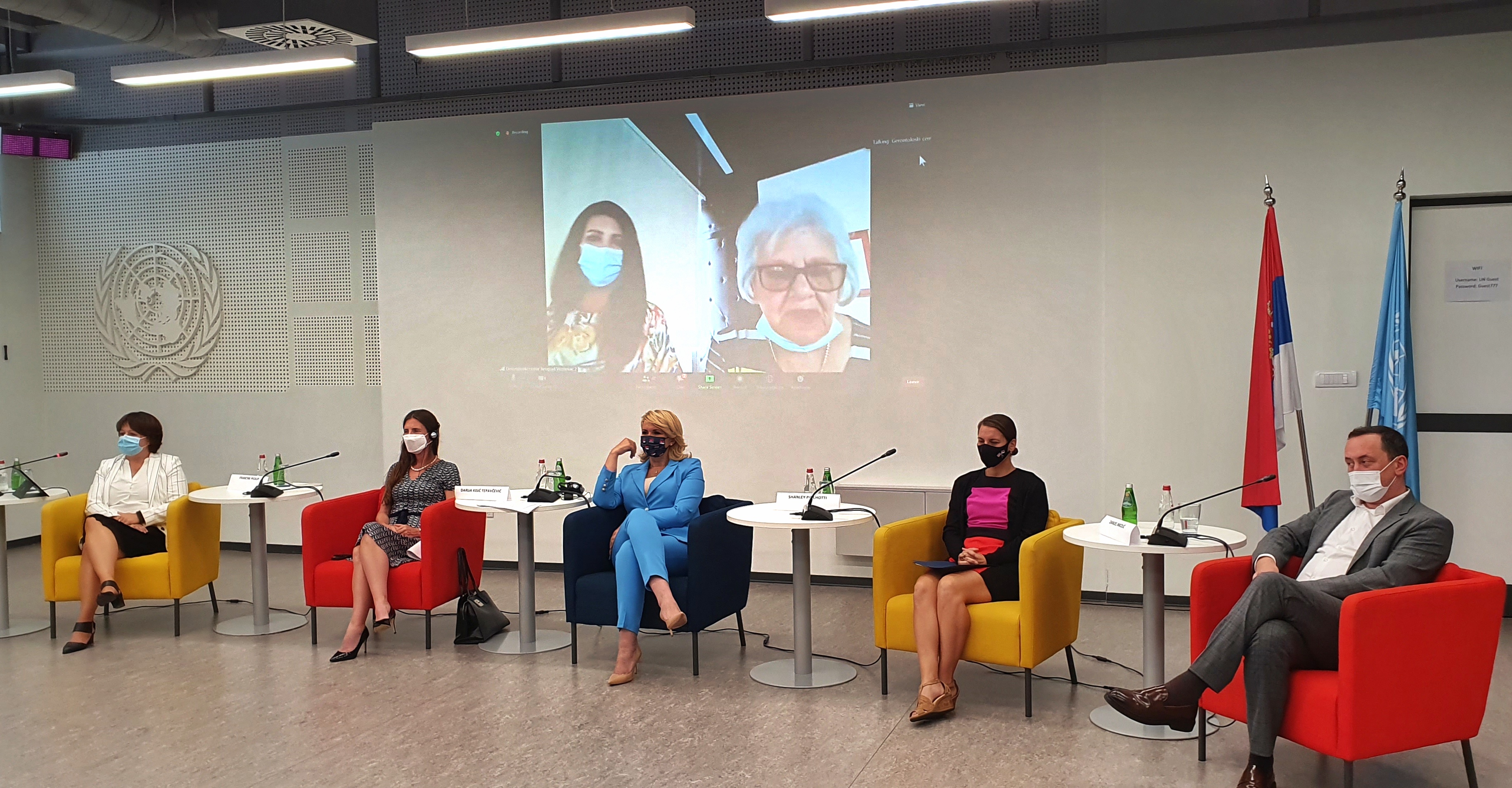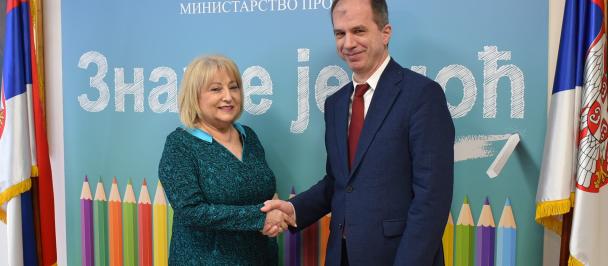Belgrade, 24 August 2021 – In order to mark the ceremonial handover of 65 tablets, 36 smart TV sets and additional equipment to 36 state-run gerontological centres in Serbia, a gathering was held today in Belgrade live and online. The participants on the event, held in the United Nation’s premises in New Belgrade, were Darija Kisić Tepavčević, Serbian Minister of Labour, Employment, Veteran and Social Affairs, Shanley Pinchotti, USAID’s Acting Mission Director in Serbia, Danijel Nikolić, Assistant Secretary General in the Government of the Republic of Serbia and Francine Pickup, Resident Representative of the United Nations Development Program (UNDP), while the directors, employees and beneficiaries of the gerontological centres participated via the internet, using the equipment that they received last month.
In late 2020, upon an initiative by the Ministry of Labour, Employment, Veteran and Social Affairs, UNDP, with the support of the General Secretariat of the Serbian Government, started the delivery of tablets, smart TVs and additional equipment to the gerontological centres in Serbia, to enable the residents, including those with sight and mobility issues, to have easier communication, via the internet, with their families and friends during the COVID-19 pandemic. An USAID donation now enabled for the scope of this initiative to be widened from the initial 20 to additional 36 state-run homes for the elderly all over Serbia. Owing to the USAID and UNDP, every gerontological centre with more than 100 beneficiaries received 2 tablets and 1 smart TV, while the institutions with less than 100 beneficiaries received 1 tablet and 1 smart TV each, as well as headsets and other additional equipment.
As emphasised by prof. Darija Kisić Tepavčević PhD, “We live in the times in which the key word is communication – as a means to make us closer to one another and overcome all the limitations imposed on us by the COVID-19 pandemic. Our senior citizens have demonstrated responsibility and readiness to accept technological innovations, using state-of-the-art equipment in communicating with their loved ones. The IT equipment donation has improved and will improve communication of the beneficiaries of residential institutions for elderly and adult people with their close relatives and friends, in the circumstances of the pandemic. Our senior citizens, with their responsible behaviour, high immunisation turnout and acceptance of the prevention and protection measures, have been a role model for all of us in this battle for public health”, concluded Minister Kisić Tepavčević.
“In the previous year, the USA managed to mobilize around 5 million dollars in aid to support Serbian fight against coronavirus, and we will soon provide more,” said Shanley Pinchotti, USAID’s Acting Mission Director in Serbia. “This was all realised in close cooperation with the Serbian Government, and taking into account Serbian priorities. As someone who has spent most of her professional career abroad, I am aware that virtual contact is not the same thing as being able to visit your loved ones. However, in times like these – when the most important thing is not catching the disease – it is still better to be able to see them virtually, than not seeing them at all. We all want to see and embrace our parents and grandparents. This is bound to happen eventually – but not before everyone becomes aware that the vaccines are instrumental in facilitating such encounters. As the numbers are rising, we must all provide our help. Accordingly, I would like to use this opportunity to encourage people to receive the vaccine,” added Ms Pinchotti.
“General Secretary of the Government recognised the potential of this excellent initiative, in times when our senior citizens, isolated in gerontological centres due to the Covid-19 pandemic, felt the most urgent need to maintain contact with their loved ones,” said Danijel Nikolić, Assistant Secretary General in the Government of the Republic of Serbia. “With the generous help provided by the UNDP in the initial phase, and then also by the USAID, we have jointly been realising this project with the aim of enabling all beneficiaries of gerontological centres in the period to come, to always be able to make and maintain contact with their loved ones, regardless of the factors preventing their physical encounter, be these viruses, epidemics, or physical distance. Many of the beneficiaries have been indeed placed in residential homes because their family members are living abroad,” added Nikolić.
Resident Representative of the UNDP, Francine Pickup, announced at the event the start of a two-year specialised IT training for senior citizens, which will be jointly organised by the UNDP and the Ministry of Labour, Employment, Veteran and Social Affairs. “We want to help our senior citizens to benefit from modern technologies and remain to be active members of the society. In this way we shall overcome the digital gap and help the elderly to learn how to communicate, pay their bills, use electronic public services, participate in electronic trade and business, or continue education via the internet,” said Ms Pickup.
Representatives and beneficiaries of the institutions which received the donations shared their experiences and emphasised that the online communication equipment has helped in improving the quality of life in homes for the elderly.
The donation of communication equipment to gerontological centres is one of the activities within the project “Together against COVID”, financed by the USAID and implemented by the UNDP, in partnership with the Ministry of Health, Ministry of Labour, Employment, Veteran and Social Affairs, Institute of Public Health of Serbia "Dr Milan Jovanovic Batut" and General Secretariat of the Serbian Government. The common goal of all the partners is a more effective and efficient response to the challenges of the COVID-19 pandemic in Serbia, in the fields of healthcare, social care and preservation of the environment.

 Locations
Locations


















